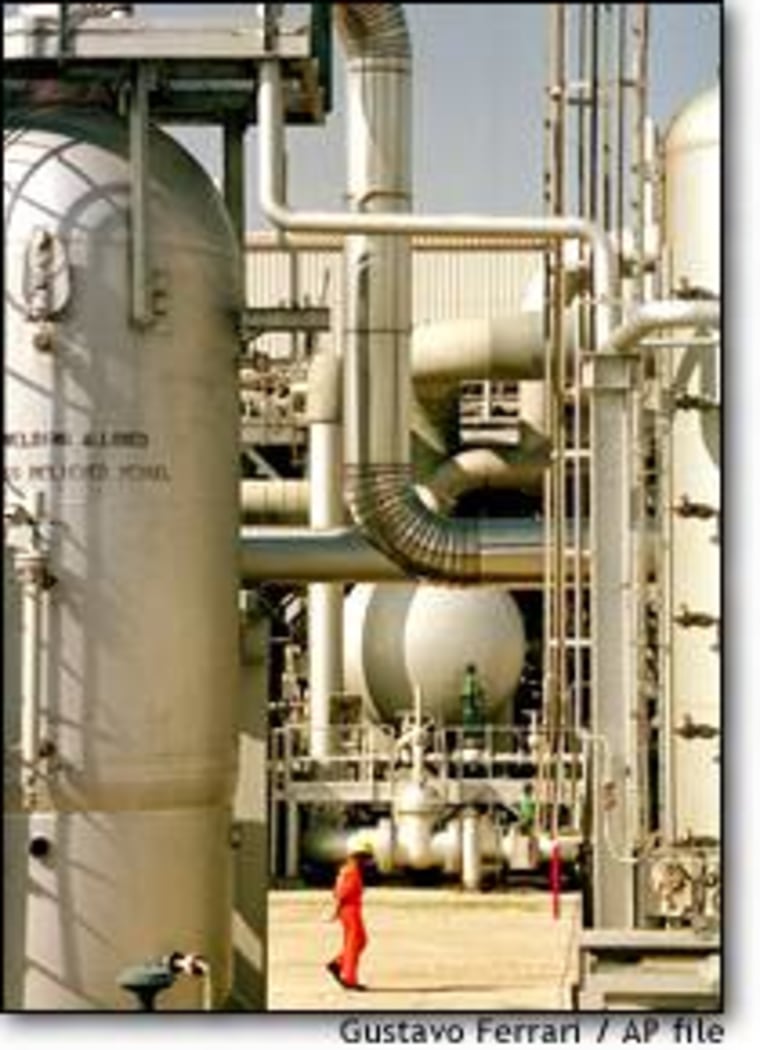The weekend bombing in Saudi Arabia has rattled the world’s energy markets and renewed fears that future attacks could target oil production and distribution facilities, and disrupt supplies. While no single attack would likely crimp the flow of oil, say analysts, the industry’s far-flung facilities provide terrorists with numerous targets. The wonder, say some, is that oil facilities have not been more heavily attacked to date.
Following suicide attacks in Riyadh last May, Saudi oil officials beefed up security with fences, roadblocks and electronic surveillance to protect oilfields, pumping stations, pipelines and ports such as the kingdom’s east coast Ras Tanura crude terminal, the world’s largest.
Even if successful, oil analysts say, no single attack would likely put much of a dent in the world’s 80-million-barrel-a-day supply. But the psychological impact would quickly be reflected in oil prices, according the A.G. Edwards energy analyst Bill O’Grady.
“You wouldn’t bottle up all Saudi exports, but you would raise concerns about supplies,” he said. “And that would raise oil prices significantly higher.”
On Monday, in the wake of the weekend attack in Saudi Arabia, West Texas Intermediate futures on the New York Mercantile Exchange hit a high of $31.29, before dipping to settle up 3 cents at $30.88 a barrel.
Brent crude futures traded in London on the International Petroleum Exchange hit a high of $29.44 and settled up 8 cents at $28.99 a barrel.
Despite increased security, key links to the world’s global oil supply chain — especially as it flows through remote pipelines and crosses oceans by tanker — remain vulnerable to attack. In Iraq, oil pipelines in remote locations have proven particularly vulnerable. Even in more stable regions, oil infrastructure presents an attractive target to terrorists.
Industry analysts, for example, have long pointed to a handful of critical shipping “choke points” — including the Strait of Hormuz, through which supertankers haul as much as 20 percent of world oil supplies.
“Just sink a tanker in there,” said O’Grady. “Or put enough terrorists on the Yemeni or Iranian side — so that a tanker could never be sure going through whether it was going to come under some missile attack — and it would probably be pretty effective.”
In the U.S., security has also been increased at oil shipping facilities. Last year, the Maritime Transportation and Security Act included new regulations governing offshore oil and gas platforms and oil-loading facilities and ports. The Transportation Security Administration has spent $170 million so far to improve security at refineries and terminal operators.
But protecting oil facilities around the world is only part of the task of defending against terrorist attacks; oil workers are also being targeted. On Monday, three gunmen opened fire on an Iraqi oil company executive’s car, wounding him in the leg and killing his son. The attempt to kill Mohammed al-Zibari, an executive responsible for oil distribution in a state-owned company, took place in the northern city of Mosul, police said.
The attack, seen as part of ongoing efforts to sabotage Iraq’s main oil export pipeline to Turkey, has succeeded in slowing the flow of oil out of the country, according to a top oil ministry official quoted by Reuters.
“Technically the line could be operated right now but we decided to wait until we put together an Iraqi protective force to guard it,” he said.
The current instability in Iraq makes securing key facilities especially difficult. But with production there still crippled by years of infrastructure decay and war damage, the risk to global supply is relatively small.
Those risks are greater in Saudi Arabia, the world’s largest producer. But it’s hard to imagine how security there could be tightened further, say industry analysts. Many residential compounds for expatriates and diplomats already resemble army camps, ringed by armed guards, surrounded by high-perimeter walls topped by razor wire and monitored by closed circuit television.
Since the bombing of a Riyahd residential complex in May, the Saudi government has also struck back, arresting suspected terrorists and seizing caches of weapons and explosives. Bush administration officials have credited those efforts with averting more widespread attacks.
But industry experts say there’s another critical reason that oil facilities have not been more heavily targeted in Saudi Arabia by terrorist groups seeking to overthrown the Saudi kingdom.
“Oil is what they think they will inherit,” said Youssef Ibrahim, managing director of the Strategic Energy Investment Group in Dubai. “You don’t want to rob yourself. You get rid of the people running the regime.”
Reuters contributed to this story.
